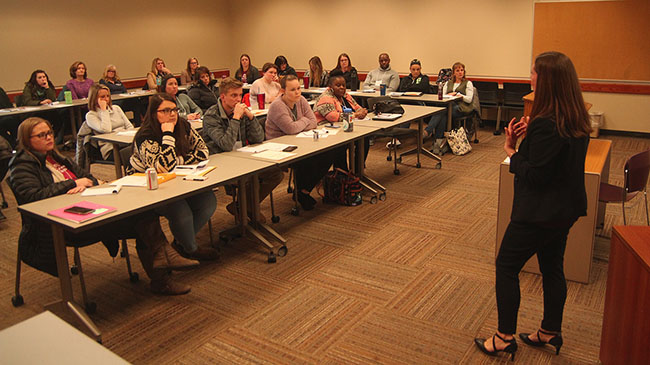By Steven Krolak
(NEW ALBANY, Ind.)–The inaugural Southern Indiana School Counseling Conference brought experts and practitioners to campus for a day of intensive sharing in a critical area of education.
School counselors generally acquire professional development by attending teachers’ conferences, which are not geared to their needs. So the IU Southeast School of Education worked with partners in the community to design a dedicated meeting based on counselor input.
“Over the last few years, the IU Southeast school counseling program has been collaborating with area school districts and school counselors, who expressed a desire for professional development that was closer to home and more relevant to their specific roles and responsibilities,” said Dr. Mary Bradley, associate professor of counselor education. “With their help, we were able to identify topics, speakers and training on topics of interest to them.”
School counselors design and deliver school counseling programs that improve a range of student learning and behavioral outcomes, according to the American School Counselor Association (ASCA), which finds the most successful programs to be those that are comprehensive in scope, preventive in design and developmental in nature.
The conference explored aspects of what that means in real life, as it is lived by both students and educators in the Southern Indiana region.
Riveting keynotes grappled with issues of importance to educators. Charles Edwards, assistant principal of Columbus East High School in Columbus, Ohio, addressed implicit bias that often prevents teachers–as well as students, parents and the community at large–from understanding the emotional struggles of children and youth at risk.
David Berman, director of the Indiana Suicide Prevention Network and the Depression and Bipolar Support Alliance of Indiana, explored the spectrum of approaches to preventing youth suicide, with an emphasis on understanding risk factors and recognizing warning signs.
Once limited to delivering vocational advice, the school counselor must now master a more complex role integrating academics, life-readiness and social and emotional issues. Workshops enabled participants to deep-dive into the realities that teachers and counselors now regularly confront in the classroom, including:
- Anxiety
- Inappropriate content on social media
- Grief
- Substance abuse
- Teen dating violence
Counselors increasingly grapple with these and other issues in combination, making it even more difficult to identify and clear roadblocks to student success. A workshop featuring the “seven challenges” program addressed co-occurring problems and life-skills deficits, giving participants an important tool to deepen emotional literacy and sharpen their own decision-making skills.

“Students in our schools are dealing with a number of social and emotional issues such as divorce, low socioeconomic status, food shortage, housing instability, and a host of other traumas such as abuse of all kinds, incarcerated parents or family members, and chronic health issues,” Bradley said. “Because of this, school counselors are asked to help these students, get them connected to outside resources, and to help them be academically successful.”
“Resilience,” a powerful documentary film, brought together many important threads in its discussion of the effects of toxic stress, which places youth at increased risk for disease, prison time, homelessness and early death.
Despite the complexity of the issues confronting both students and their counselors, Bradley is optimistic about the future.
“I believe more and more people are seeing the needs of our students, are seeing the challenges our students are facing and the impact these challenges bring to the school setting,” Bradley said. “Because of this, I believe more and more people see the need for school counselors, and are finally realizing school counselors are an essential part of ‘educating’ our students, and helping them build the skills necessary to be successful, productive citizens in the future.”
Bradley hopes that the conference will demonstrate that the School of Education is listening to the needs of local K-12 schools, as well as their students and communities., and that it can provide support that goes beyond simply training future educators.
“I hope this event says we believe the School of Education can be an advocate for our community members, can help meet the needs of our community members, and can be collaborative partners with K-12 schools but also with businesses, employers, and other social service organizations,” Bradley said.
Homepage photo: David Berman, director of the Indiana Suicide Prevention Network and the Depression and Bipolar Support Alliance of Indiana, delivers a keynote speech.


